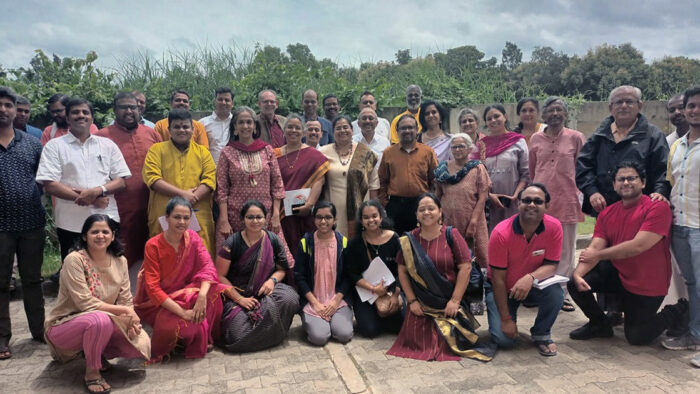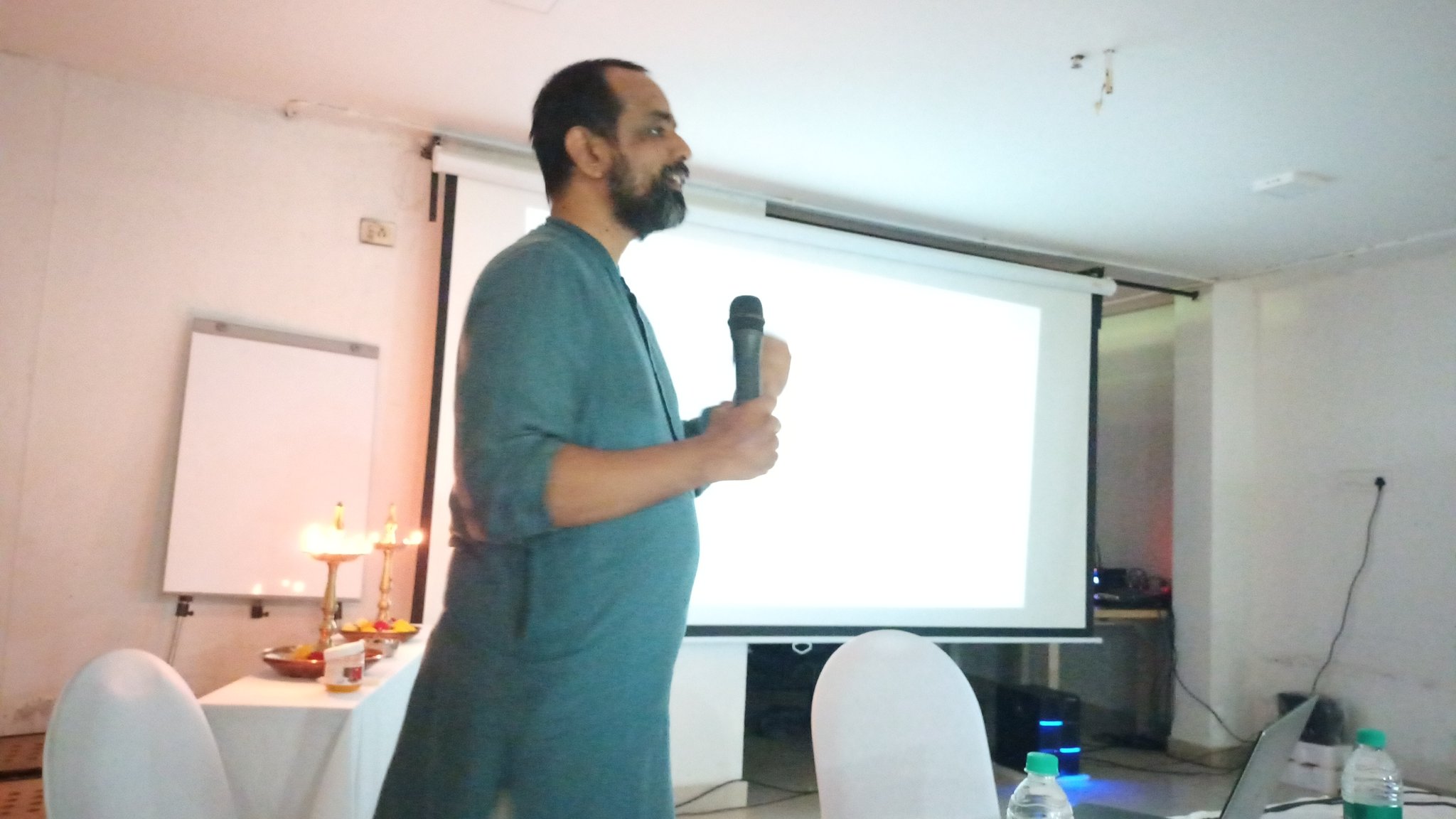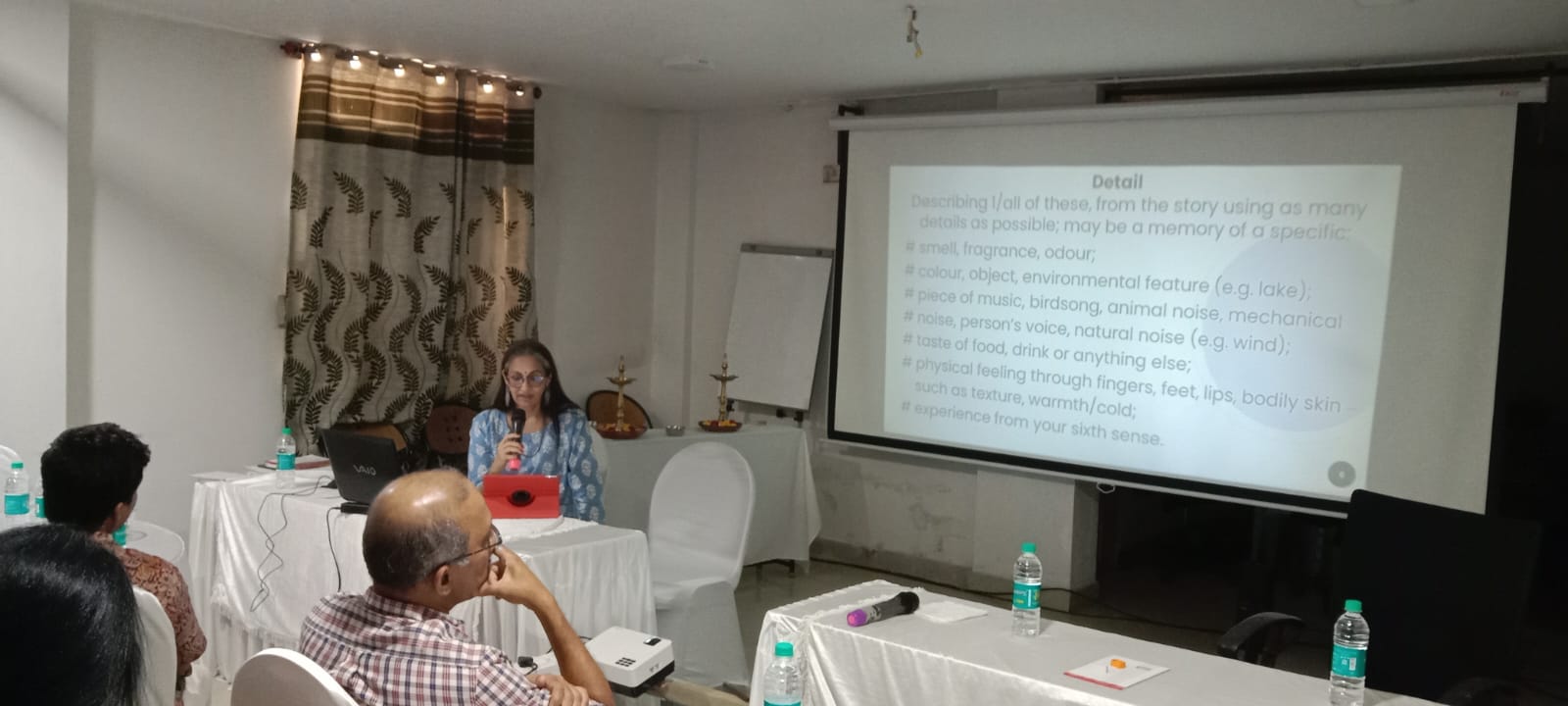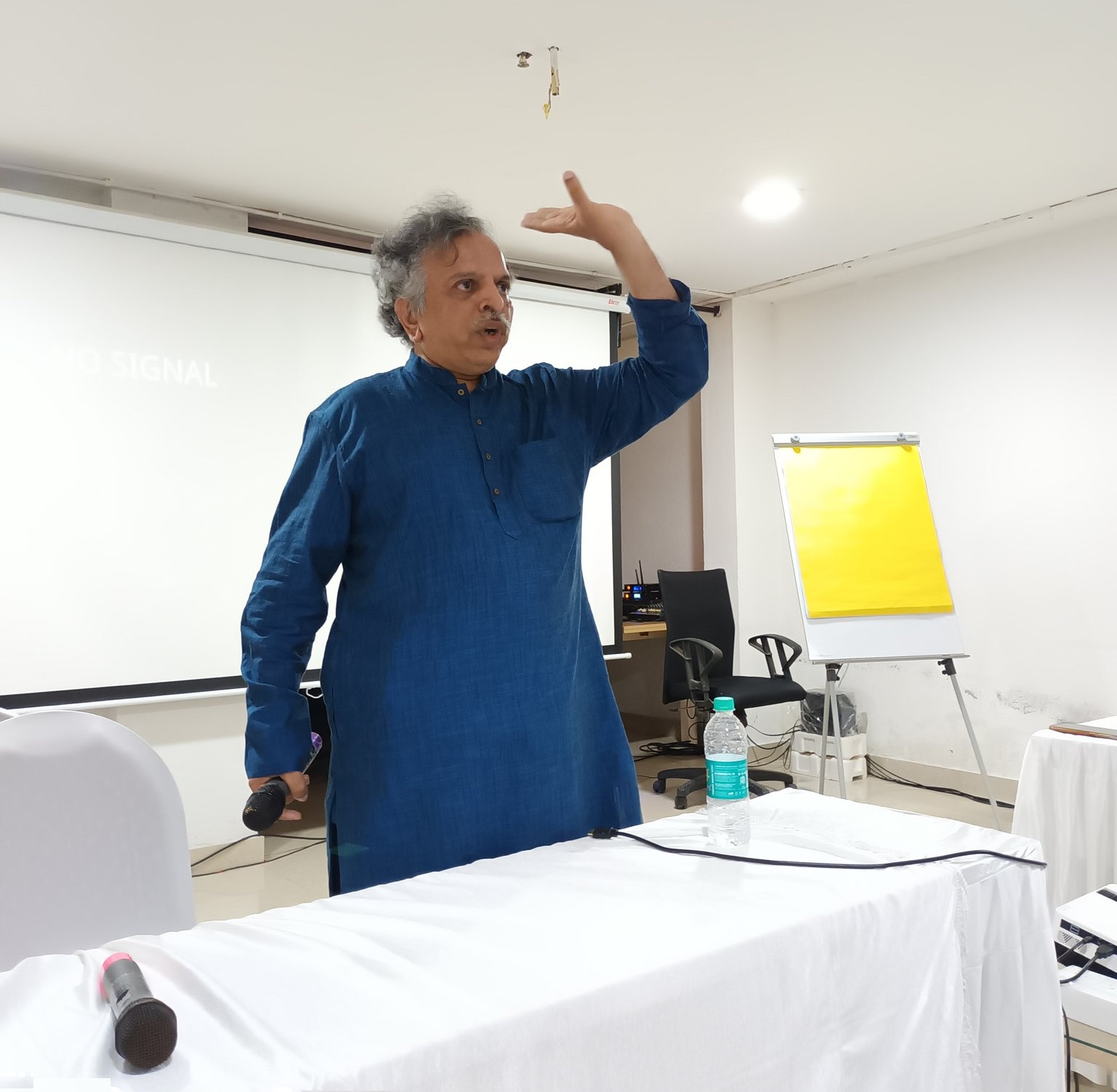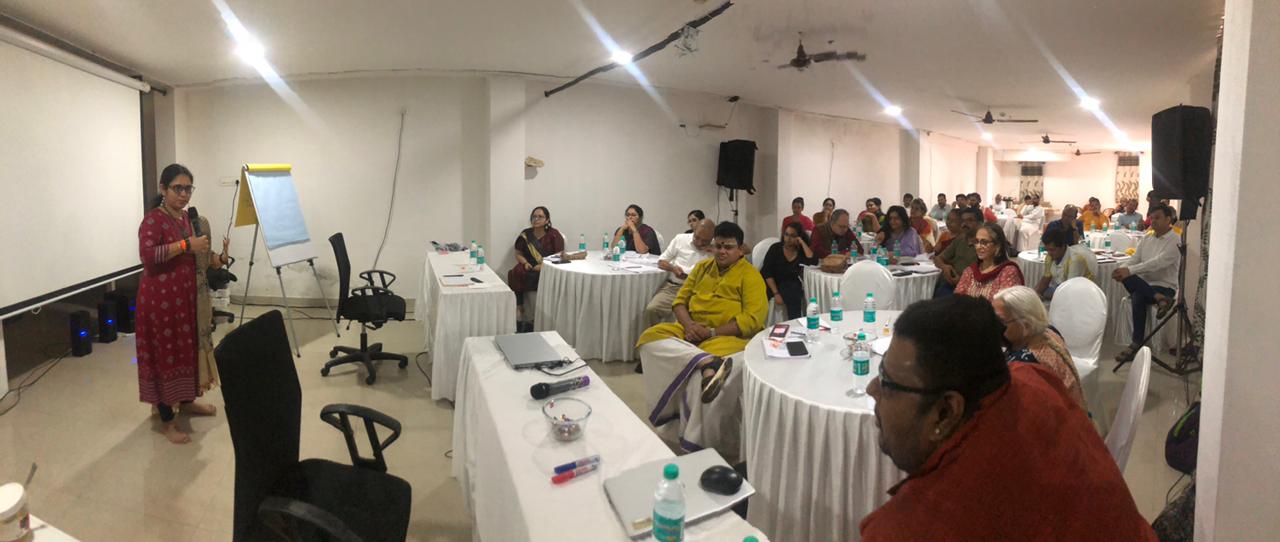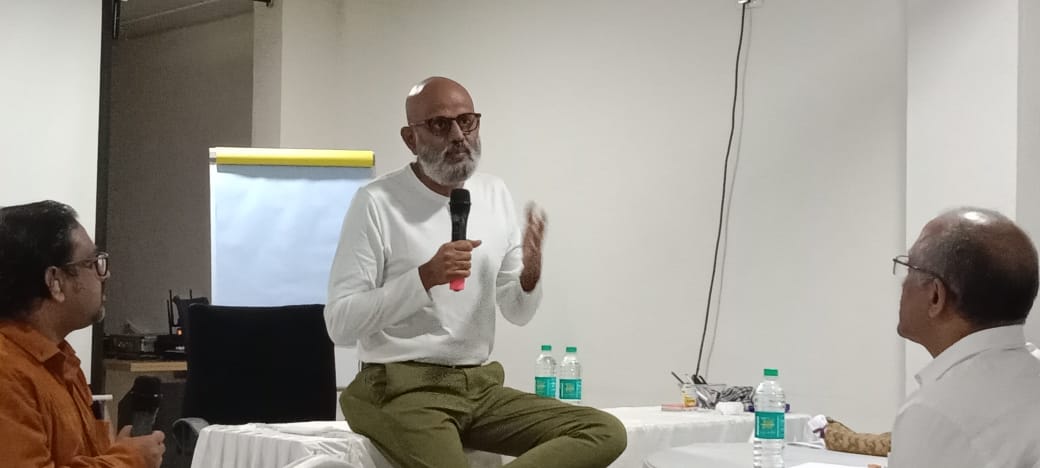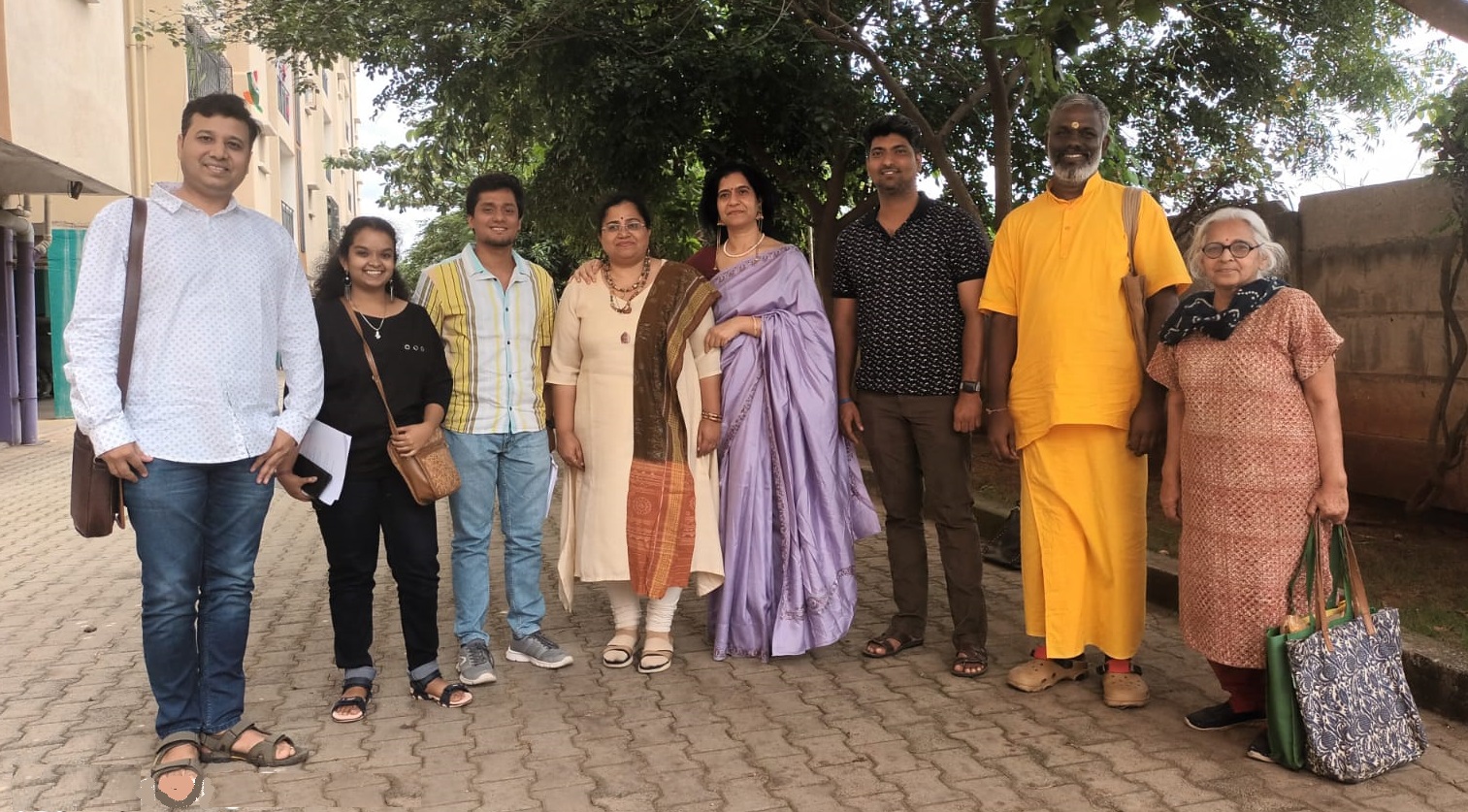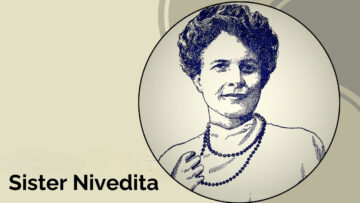IndicA Today’s Authors’ Training workshop came along at a crucial juncture in my life. Until this point writing was only a passion, a hobby for me that I sought to pursue on and off. Deep down, I knew that it is also my profession because this one skill has got me so many opportunities. But was I doing justice to the craft itself? I don’t think so.
I knew writing is an integral part of me. So much so that I felt frequently disconnected when I wasn’t writing which has been for quite some time now. I would feel liberated and healed, connected to the purpose of my life every time I wrote even a small piece.
But I frequently asked myself – where am I headed? How can I add more value to what I wrote? Admittedly I was confused and unfocused.
As someone who holds the Indic civilizational cause close to her heart, I have been following Indic Academy’s work for a long time now and it has been a cherished dream to be an active part of the organization. How? That I did not know. That is when Bhagavan decided that I have slept enough and gave me this opportunity out of nowhere!
Close to the workshop, a sudden loss of a loved one had left me going through a rollercoaster of emotions. Yet I picked myself up and decided to go because from within I knew I had to keep up to my original goal of learning and connecting to various scholars and writers in the Indic field.
And what an experience it was! There is an overwhelming quality I have observed with my limited intellect among Mahatmas and true scholars – Humility. This is accompanied by warmth, determination, inspiration and sheer approachability. It just fills your heart up because their work is phenomenal. They are truly dedicated torchbearers of the knowledge systems of Bharatavarsha, yet they embody this principle of functioning as an instrument of Bhagavan. For when you work for a higher cause, YOU disappear!
The workshop was beautifully organised by Dr. Yogini Deshpande, Shivakumar GV Ji and Rekha Dhar Ji of IndicA Today. From every session we had something to learn and from every interaction we walked away richer. The venue of the workshop which was away from the buzz of the city had that added element of serenity and pleasantness. It served to enhance the texture of our conversations as we took long walks around the venue discussing various insights and topics from the perspective of Dharma.
The workshop commenced on 12th August with Dr. Jayaraman’s sessions on Tantrayukti – An Ancient Indian Methodology of Text and Thesis Construction. Even in our universities, research methodologies are practically shoved down our throats. We never realise the importance of rigour in research or even research for that matter! Ancient India was known for the depth and detail of her classical works such as Charaka Samhita and Arthashastra. Where did that rigour come from? From a flawless methodology for writing and research called Tantrayukti.
It offers multiple simple yet detailed tools for researching, organising and writing our content. It is only through this session that I even understood the importance of Review of Literature. Tantrayukti refines how you think. It is a thought process by itself that needs to be introduced to us earlier on.
What struck me was the way Dr. Jayaraman chose to introduce the path of writing to us through the metaphor of Bhagavan Surya explained in a Mantra from the Rig Veda.
तत्सूर्यस्य देवत्त्वं तन्महित्वं मध्यकर्तोर्विततं सञ्जभार ।
The greatness of Bhagavan Surya is that he travels in his own trajectory and withdraws his rays at the given time. This power of self-mastery is true freedom. An insight that I had was Shri Surya never fails to rise at that specific hour and nourish the entire world with light. This is discipline. And freedom is the expression of discipline. So it is for the writer. It is only Nishtha that can provide us with freedom in creative expression.
When laying the ground for us to understand the essentials of an article or text, Dr. Jayaraman spoke about three key aspects – content, language and structure. To explain how their expression can be perfectly balanced, he chose to state how Shri Hanuman had the most auspicious expression in his speech and how that comes from rigorous training and discipline. It struck a chord with me, because Shri Hanuman is revered by a lot of us as not only an icon in Dharma and Bhakti, but also as a national youth hero. Perhaps as Dr. Jayaraman stated, if we know why we write and the goal we wish to achieve, our creative expression can also reach its zenith.
To know why one writes, one must delve into the science of Tantrayukti. Tantra is a technique and Yukti is a device. It is that which protects, enriches and systematises a piece of writing, be it scholarly or otherwise. Apart from the 32 precise yet detailed Tantrayuktis, we were also astounded by how the science offers insights into the characteristics of a well-written treatise (Tantragunas) and the various errors that occur when writing (Tantradosas). One Yukti that stuck with me is a fundamental one – developing the right doubt or question from which the quest for a resolution develops and takes us forward.
If Dr. Jayaraman dealt with the techniques and tools of writing, the next session with Dr. Swaroop Rawal led us to explore the other side of the process of writing – Reflection. If the previous session was an eye-opener, this one was liberating for me as a writer. Dr Swaroop took us through her journey as a pure qualitative researcher in her field and as a transformative educationist and teacher.
As she guided us through the reflective processes, providing insights and tools for writing along the way, we could see the passion for education and research flowing through her seamlessly. That was the common thread amongst all speakers of the workshop – they are completely in alignment with the purpose of their lives in thought, speech and action. Their work reiterates how essential this attunement is for our own lives.
Dr. Swaroop led us to ask certain fundamental questions – what is the soul of any work that I do? What am I most concerned about and what can I do about it? What are my core values?
Do these questions ring a bell? They not only form an essential part of a writer’s journey but also one’s own path of self-discovery. Most of us either ask these questions and forget about their answers or never delve deep into them. Perhaps it is time we did as it might lead us to areas within us we never thought we would discover.
She gave us various practical exercises through which research could become experiential and writing as a way of connecting to ourselves, also refining how we meet the larger audience. One of the participants rightly echoed, “Experience is not learning. Reflection on that experience is learning.”
With the third session by Dr Nagaraj Paturi, further vistas of thinking opened up. Being an ocean of knowledge owing to his vast teaching and learning experience, he took us into the world of discerning between fact and interpretation through anecdotes from the narratives of the liberal and post-modernist worlds and why the epistemology of history is different from that of itihasa. While many of us are passionate about the Indic cause, we are in dire need of sharpening our persuasion skills if we are to reach the wider section of the public. It is here that he highlighted the importance of Purvapaksha, Khandana and Manthana.
What will also stay with me is the in-depth explanation of Anubandha Chatushtaya where the writer narrows down the content of the book (vishaya), decides the method and qualities of communicating with the audience (sambandha), understands the nature of the target audience (adhikaari) and the utility and trajectory of how a narrative develops (prayojana). Again, Dr. Nagaraj too offered his own perspectives on why the Review of Literature forms the backbone of any research for it becomes an important source of information and evidence for the readers. One key takeaway from Nagaraj Ji’s session – “After reading your article, the reader should have grown more – How? That is for us as writers to explore.
The fourth session was conducted by best-selling author, Smt. Sai Swaroopa Iyer who brought to the table her expertise developed over the years in the form of a generous and incredibly helpful set of habits and practises for an aspiring writer in any genre. Most importantly she emphasised that writing is a Nitya Pooja or a daily offering unto the divine and a Tapasya, a rigorous discipline by itself. That is where the title for this essay comes from.
She guided us on how to get into the nitty-gritties of writing by breaking down tasks effectively, differentiating the time allotted for research and writing, highlighting the importance of reading and reflective learning and helping us understand why it is essential that we write daily. She also gave us some amazing tips to get going with fiction and nonfiction writing.
Next was the surprise, cherry-on-the-cake valedictory session by Shri Hari Kiran Vadlamani, the Founder of Indic Academy, the mother organisation of IndicA Today. With succinct clarity and humility that comes from being wholeheartedly dedicated to a cause that is altering and building civilizational narratives and moments, he outlined the future vision of Indic Academy, its place in the larger society and our role as writers and contributors in helping it reach its fulfilment through a simple diagram. He stated why it is important to convert knowledge into service for people to experience and linked it with how our culture is integrated and experiential by nature.
Finally he went on to highlight the goals of Indic Academy as “Preservation, Protection and Promotion”, its areas of work as “Intellectual, Cultural and Spiritual” and its core qualities as “Authentic, Immersive and Transformative.” Thus, possibly every area of Indic Knowledge Systems is integrated into the precincts of the organisation and the kind of services and experiences its offers. What will stay with us for days to come is how he emphasised upon the urgency to create a well-researched knowledge bank for IKS in the contemporary times where every force is either trying to push it down or take away the wisdom it provides without crediting the source itself. This is where you, I and everyone else can step in and contribute to preserving the very soul of this nation!
We concluded the workshop with a session on ‘Writing a Series’ by Shri Shivakumar GV and another session on ‘Writing Book Reviews’ by him and Dr Yogini Deshpande, Editor-in-Chief of IndicA Today. Shivakumar Ji reflected upon his journey of developing and writing a series on the Mahabharatha and explained why it is important that we dedicate ourselves to one text or one area such that we can explore its offerings completely.
In the next session, for the first time I understood the importance of writing book reviews through Yogini Ji’s presentation and the critical role it plays in building a positive civilizational narrative. We were given a complete toolkit by both the speakers on how to write a detailed book review such as setting the context and building the narrative and why it is essential that the reviewer merges with the review.
It was a beautiful irony that we concluded with an insightful session on an area where the journey of most writers begins. We also received interesting tidbits from both Yogini Ji and Sai Swaroopa Ji on how authentic friendships can help us reach great heights and stay accountable to the goals we set for ourselves. That is the social psychology of man.
As a young, budding writer in this field I was left feeling amazed and humbled at the amount of knowledge in that room. We were fortunate to interact and connect with such dedicated and scholarly minds across various professions and age groups. The interactions were authentic, free, invaluable and sans any ego! There was only curiosity and enthusiasm floating in the workshop hall. Aside from gaining insights about writing, I could also engage in discussions on Yoga, Bhakti, Sanskrit, Psychology and why I must start off with a pertinent question to enhance my quest even as a reader.
I have gained a lot in three days alone. Now I look forward to an entire lifetime of learning, writing and sharing this priceless knowledge. As Swami Sharadananda of Chinmaya Mission would state during his discourses on Srimad Bhagavatam and Narada Bhakti Sutra, “A Bhakta always asks for one thing alone from Bhagavan – more and more Satsanga. For through Satsanga, Bhakti grows!”
In this context, Satsanga is the company of like-minded individuals who have immersed themselves in a Dharmic cause that is larger than themselves. Satsanga is meeting those through whose work Bhagavan lives in this world! May we stay in Satsanga and may we become Satsanga for all through our being and doing.
Disclaimer: The opinions expressed in this article belong to the author. Indic Today is neither responsible nor liable for the accuracy, completeness, suitability, or validity of any information in the article.

